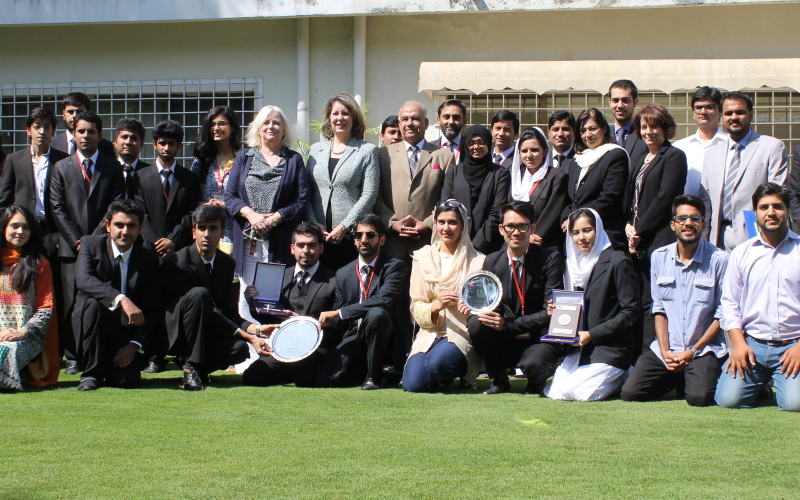By Rimsha Ali Shah
“All rise, the court is now in session!”
Twenty-four aspiring lawyers stood still as the respected judges took the bench in the first-ever Pakistan Law Moot, organized by Pakistan-U.S. Alumni Network (PUAN) member Mr. Daniyal Hasan, through the Alumni Small Grants program and supported by the U.S. Mission in Pakistan and the United States Educational Foundation in Pakistan (USEFP). The two-day law moot court was a competitive legal playground where aspiring lawyers not only dissected the law and probed through legal loopholes, but also worked with the pressure of presenting before a bench of judges, all while upholding the letter of the law.
For the bystander, the Pakistan Law Moot was a combination of all legal television series rolled into one. It was not just a test of the students’ advocacy skills, but also their knowledge of constitutional law, particularly the laws governing freedom of speech, along with their understanding of the High Court and Supreme Court jurisdictions.
The eight teams, carefully chosen through a competitive process, represented the most promising minds from the legal fraternity across Pakistan. Each team underwent a grueling selection procedure that focused their energies on extensive legal research. These teams were then selected to compete in the quarter finals on Friday. The top four teams with the most effective oral and written arguments then made it to the semi-finals, with two teams emerging as the clear contenders for the Pakistan Law Moot Finale.
Participating teams included law students from Azad Jammu and Kashmir University; Indus College of Law, Hyderabad; International Islamic University Islamabad (Women’s Campus); Pakistan College of Law, Lahore; Federal Urdu University, Karachi; Abdul Wali Khan University, Mardan; Islamabad School of Law; and Lahore University of Management Sciences.
Dissecting the Law: Participants Showcase Their Advocacy Skills
A hypothetical Cyber Crime Act was introduced and the moot problem was a writ petition that called for the Cyber Crime Act to be declared as unconstitutional, on the basis of curbing the fundamental right of freedom of speech. Each of the eight teams argued as both petitioner and respondent at least once during the course of the quarter finals. “The moot problem touches up on a pertinent issue that has been at the forefront of the debate on fundamental rights and by presenting both cases before the bench here at Pakistan Law Moot, my understanding of the law has further strengthened,” said Mr. Omer, student of Lahore University of Management Sciences.
Participants Learn About Exchange Opportunities at Networking Dinner
Day one of the Pakistan Law Moot ended with the teams networking with officials from the U.S. Mission in Pakistan and USEFP at a reception dinner hosted by Dr. Daniel S. Mattern, Country Cultural Attaché. Participants learned about the different exchange programs administered by the U.S. Mission in Pakistan and USEFP, along with participating in immersive discussions on legal practices in the United States and Pakistan.
Dr. Mattern congratulated Mr. Hasan on putting together an event that challenged and honed the legal skills of Pakistan’s future lawmakers. Saad Wyne, a partner at Legal Oracles, Advocates and Corporate Consultants, and a judge at the Pakistan Law Moot said, “Moot courts help students prepare for what is coming their way. They are used to a protected environment and aren’t aware of the pressure of a real court room. This prepares them for the practice of law in the real world.”
Final Day: PCL and LUMS Lawyer Their Way to the Prize
“But Counsel, in Pakistan what is the yardstick to determine what offence should be cognizable”?
The final round had Pakistan Law College and Lahore University of Management Sciences go head-to-head, with the former arguing as the respondent and the latter as the petitioner. For the finale, a five-member bench including Mr. Saad Wyne, Ms. Karen Norris, Ms. Shahina Akbar, Ms. Rita Akhtar and Mr. Nauman Masood, presided over the proceedings. The teams essentially argued the same moot problem, with a slight change: the petitioner now also included six college students who had posted images of their professor online.
From 9:30 am -11: 30 am on Saturday morning, the mock court room was buzzing with arguments for and against the Cyber Crime Act; constitutional fundamental rights; freedom of speech; the fundamentals of natural justice and individual rights versus community rights. With temperatures running high, each team not only had to maintain a calm and composed exterior, but also articulate their arguments based not only on rhetoric but on relevant case laws and the Constitution. “Each team was well-versed and thorough in their research, their written briefs and their oral arguments. The quality of debate was promising,” said Ms. Norris, a former Federal Prosecutor currently serving with the U.S. Mission in Pakistan as Resident Legal Advisor.
Ms. Akbar, Advocate Supreme Court added, “The teams handled the questions related to the judiciary quite well and the overall quality of debate was good. Such events provide Pakistan’s future lawyers with learning opportunities and exposure, and should be replicated across the country.”
In her closing remarks, Counselor for Public Affairs, Ms. Christina Tomlinson appreciated the young scholars of Pakistan law and encouraged them to play their due role in promoting justice and the rule of law in the country. PUAN Executive Board Member, Mr. Talat Khurshid appreciated the enthusiasm and commitment of the young alumni in conducting activities benefitting communities across PUAN’s 12 chapters.
For Daniyal Hasan, SUSI 2014 alumnus, the Pakistan Law Moot was a dream come true. Congratulations to Daniyal and his team from the entire Pakistan-U.S. Alumni Network on successfully executing his idea through his vision and perseverance. We’re proud of you!
Take a look at the photographs from the event here: https://www.flickr.com/photos/pakusalumni/albums/72157659085257158







